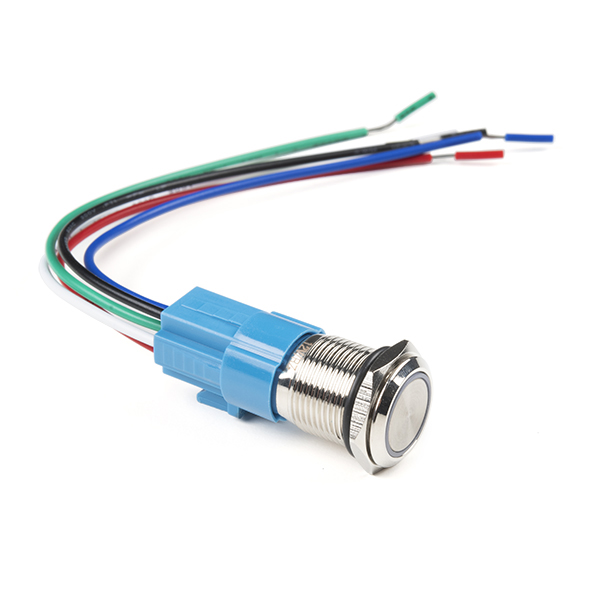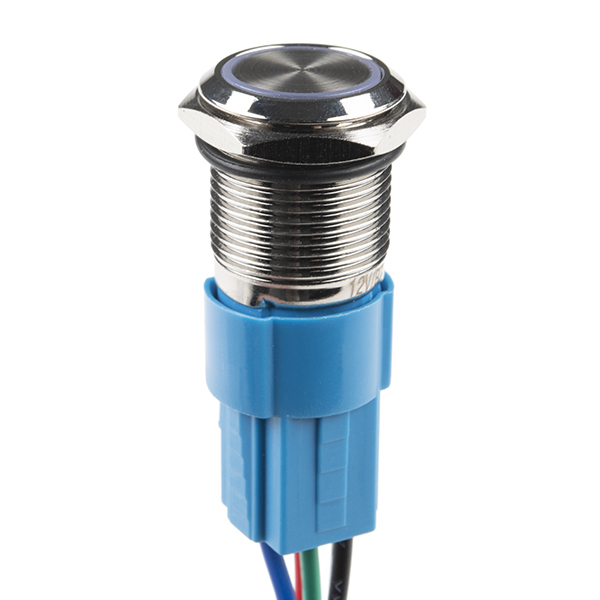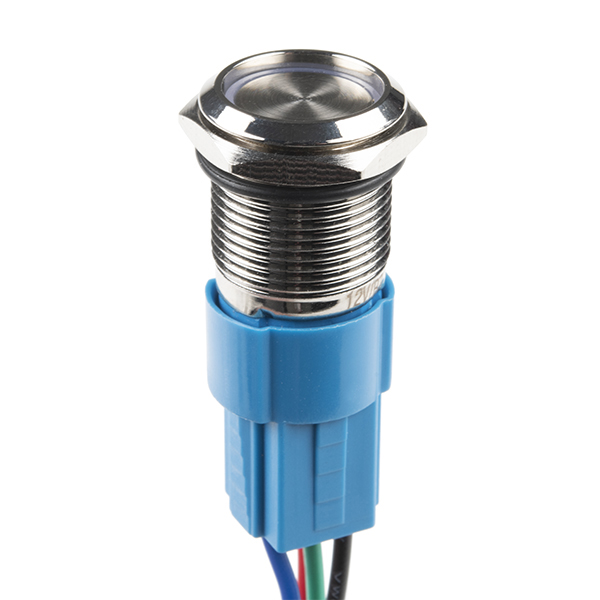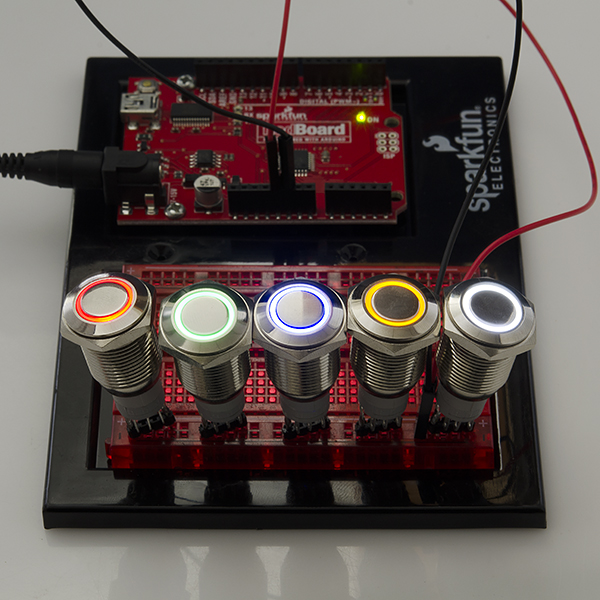Metal Pushbutton with Wires - Latching (16mm, White)
This is a perfect choice if you are in need of a heavy duty push button! These metal push buttons are a very tough, small, panel-mount latching switch with an illuminated white LED ring. It is a SPDT with 16mm threading and 1mm pitch. This button is perfect for basic On/Off functions. Overall length (including leads) is 1.5" and has small solder lugs for connection. These latched buttons are rated up to 3A and 250VAC while the LED is rated for 5-12V.
Note: The images for this button show an LED voltage rating of 5V. We have verified that the voltage range for the the LED to be 5-12V. We are currently communicating with our supplier for new documentation. Trust the branding on the button to verify your voltage requirement.
- Stainless Steel Body
- IP65 Weatherproof Rating
- Tamper Resistant
- Latching Operation Type
- White LED Ring
Metal Pushbutton with Wires - Latching (16mm, White) Product Help and Resources
Wireless Audio Bluetooth Adapter w/ BC127
December 14, 2017
Build a custom wireless audio Bluetooth adapter using BlueCreation's BC127 and add it to your old speaker system!
Pinout
The pushbuttons (like the momentary https://www.sparkfun.com/products/11966 or latching https://www.sparkfun.com/products/11971 ) have an indication of the pinout of the buttons on the side of the plastic molding. One way to test the switch is to use a multimeter turned to the continuity setting. Here are what the pins (not in any particular order associated with the pushbutton's spades):
+ = LED Anode
- = LED Cathode
C = "Common Ground"
NC = Normally Closed
NO = Normally Open
One way to light the LED on the metal push button would require you to wire it so that when you press down on the button, the led would light up. You would need 5V to light the LED ring. It can be lit up with a smaller voltage but the LED won't light up as bright.
To connect the battery to the button so that it only lights when the switch is pressed down (momentary or latched), you would connect 5V to the "+" pin on the switch. This is assuming that your system is using the same voltage source that is 5V. Then from the "+" pin, you would wire it to the normally open (NO) pin.
Another wire would be connected from the "-" pin to the C pin. The C pin would essentially be connected to your ground. So as you press down on the button, it would flip the switch and complete the circuit from the normally closed (NC) pin to normally open (NO) pin while lighting the LED ring at the same time. It might be a good idea to use a current limiting resistor (like standard 330Ohm resistor) if you are using 5V directly from your power supply. The LED won't be as bright but you also wouldn't be reducing the life of the LED. I am not sure of the electrical characteristics of the LED that is in the pushbutton.
Core Skill: DIY
Whether it's for assembling a kit, hacking an enclosure, or creating your own parts; the DIY skill is all about knowing how to use tools and the techniques associated with them.
Skill Level: Noob - Basic assembly is required. You may need to provide your own basic tools like a screwdriver, hammer or scissors. Power tools or custom parts are not required. Instructions will be included and easy to follow. Sewing may be required, but only with included patterns.
See all skill levels
Core Skill: Electrical Prototyping
If it requires power, you need to know how much, what all the pins do, and how to hook it up. You may need to reference datasheets, schematics, and know the ins and outs of electronics.
Skill Level: Competent - You will be required to reference a datasheet or schematic to know how to use a component. Your knowledge of a datasheet will only require basic features like power requirements, pinouts, or communications type. Also, you may need a power supply that?s greater than 12V or more than 1A worth of current.
See all skill levels
Comments
Looking for answers to technical questions?
We welcome your comments and suggestions below. However, if you are looking for solutions to technical questions please see our Technical Assistance page.
Customer Reviews
3.6 out of 5
Based on 5 ratings:
1 of 1 found this helpful:
very nice look
The button looks great but to activate the switch the button needs pushed way down into the unit and is difficult to do. I ordered a different size (25mm) and am happy with it.
Haven't mounted it yet but very cool!
The button latches easily, the led ring around these buttons looks stellar, good clicky feedback. Overall great product.
Good product
I used this for a replacement part and it was definitely better than the original. Works as advertised!
Mostly Good
Bought a few of these to try out.
They are decently made, and easy to wire.
One had the LED go dead after two days of continuous usage at 12v, but the rest are still kicking after a month.
2/3 Reliability
A few weeks ago, I bought three of these, and one of them was broken before I even put it into use. The mechanism inside broke in the "ON" position, and although the button would push, it would not switch to the "OFF" position.
Very disappointing.
Hello!
Sorry about the issues with the latching buttons. I see you also have an open case with our tech support department, they should be reaching out to you about both this and the LEDs. They're normally really good at taking care of issues like this.





I yearn for the day when someone makes an RGB version of these!
Does the led have a resistor for 5 volts or no resistor so you can set your own according to your requirements?
I've hooked mine up without any additional resistors directly to 5v on my Arduino Mega, and they work quite fine. I'm assuming that there is one inline, or the LED is capable of taking on the full load
Just got a pair of these and they're beautiful. Nice clean tactile click, sounds and feels solid like a car door. I plan on buying lots more.
Are the switch pins separate from the LED pins? For example can I use this button to switch a 12v power supply on and off, and power the LED from a separate 5v power supply?
The switch pins are separate from the LED pins. In the fourth product picture you can see the LEDs lit-up with the LED pins plugged in the + & - power rails. The three SPDT switch pins are dangling unused in front of the sockets. In the second product picture you can see the switch labels showing which ones are the common, normally-open and normally-closed pins.